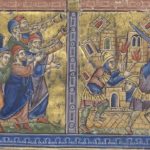We run our website the way we wished the whole internet worked: we provide high quality original content with no ads. We are funded solely by your direct support. Please consider supporting this project.
Did God use Satan to test Job?
Question: In Job 1:21 and 2:10, Job seems to accept “adversity” from God while continuing to trust him. Job blames his troubles on God (i.e. “He shattered me” [16:12], “He breaks me down on every side” [19:10], “For he performs what is appointed for me” [23:14]). In Chapters 1 and 2, God even seems to encourage Satan to harm Job. This seems to refute your reading of Job and the “warfare” approach to understanding evil which you advocate (in Is God to Blame? and Satan and the Problem of Evil). Satan has to ask God for permission for all he does—which means God must have a reason for allowing every particular evil in the world. This isn’t about a battle between God and Satan, but about how God uses Satan to test us.
Answer: I will make five brief comments in response to this objection.
1) This objection is rooted in the assumption that Job’s perspective on his suffering is accurate. But throughout his ordeal, Job attributes many things to God that we do not consider accurate or pious. For example, Job claims that God mocks the suffering of innocent people; that God causes judges to make poor judgments; and that God ignores the prayers of oppressed and dying people (Job 9:23–24, 21:17–26, 30–32; 24:1–12). Moreover, Job wrongfully concludes that God must be a ruthless predator who arbitrarily destroys him for fun (e.g. Job 10:8–10, 16:7–17; 30:18, 21). We have to be very careful, therefore, in extracting theological truth from the mouth of Job or his friends.
2) When God finally shows up at the end of this book, he rebukes both Job and his friends for the things they said about him. Job confesses that he spoke of things he did not understand (42:3) and then repents (42:6).
3) The genre of Job is poetic drama, and the prologue functions as a literary device to set up the story (like the conversation between the rich man and Lazarus in Luke 16). So I don’t think it’s wise to base doctrine on a literal reading of this passage (i.e. that Satan and God literally have conversations in heaven), since the genre indicates that this was not its intended purpose.
4) Even if one insists on reading the prologue literally, why should we universalize this passage to conclude that Satan must always ask for specific permission to do things or that every atrocity is a “test”? Isn’t there something grotesque about calling (say) the kidnapping, raping and then murder of a child a “test”? What does the dead molested child learn from this “divine testing”?
5) We must also note that Satan was “roaming about the earth” before he came to the throne, and there’s never a suggestion that he got God’s specific permission to do this. Indeed, God asks, “where were you?” This too suggests its unwarranted to conclude that Satan receives specific permission for everything he does.
Category: Q&A
Tags: Bible, Old Testament, Problem of Evil, Q&A
Topics: Spiritual Warfare, Cosmic Conflict, The Problem of Evil
Related Reading

A Dialogue with Derek Flood: Is the Bible Infallible?
I’m happy to see that Derek Flood has responded to my four part review of his book, Disarming Scripture. His response—and, I trust, this reply to his response—models how kingdom people can strongly disagree on issues without becoming acrimonious. And I am in full agreement with Derek that our shared conviction regarding the centrality of…

The Heresy of “Just War”
Since the time when the Jesus-looking kingdom movement was transformed into the Caesar-looking “militant and triumphant” Church, there has been a tradition of Christians by-passing the enemy-loving, non-violent teachings of the NT and instead appealing to the precedent of divinely-sanctioned nationalism and violence in the OT whenever they felt the need to justify engaging in…

Reading the Bible “by Faith”
The cruciform approach to reading the Bible—and specifically the culturally-conditioned and sin-stained portraits of God—requires faith on the part of the reader, which I argue in Crucifixion of the Warrior God. On one level we can discern by faith that often times God broke through the limitations and sin of the ancient authors, for we…

Did God Give Violent Laws? A Response to Paul Copan (#13)
In his critique of Crucifixion of the Warrior God (CWG) at the Evangelical Theological Society annual meeting in November, Paul Copan takes issue with my contention that the violent dimension of OT laws reflects God accommodating the fallen and culturally conditioned perspectives of his people at this time. In my view, God was stooping to…

Why Bart Ehrman Doesn’t Have to Ruin Your Christmas (Or Your Faith) Part 7
This is the seventh of several videos Greg put together to refute Bart Ehrman’s claims published in the article What Do We Really Know About Jesus? In this segment, Greg argues against Ehrman’s claim that the Roman census in the birth narrative was fabricated. If you missed the first six installments you can find them here, here, here, here, here and here.

If the violent depictions of God in the Bible are not completely accurate, isn’t all of Scripture up for debate?
Question: I’m very intrigued by your cruciform hermeneutics and can’t wait for your book (Crucifixion of the Warrior God) to come out. But I have to say that it strikes me as dangerous. You’re basically saying that the violent portraits of God in the OT are not completely accurate. But doesn’t this place us flawed…
